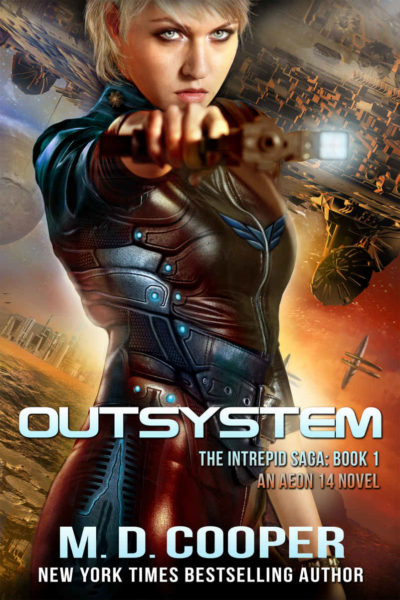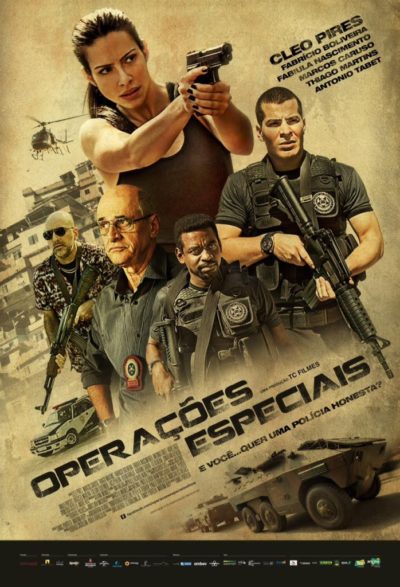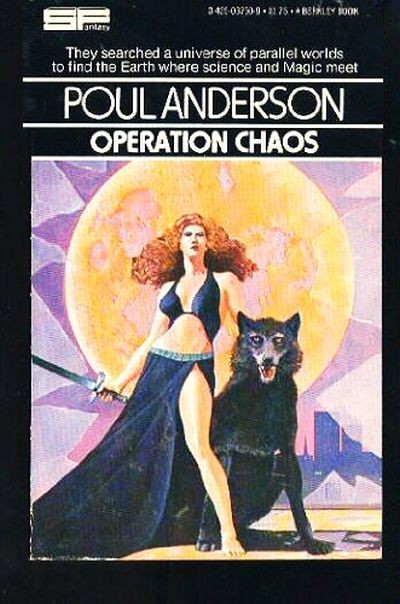Literary rating: ★★½
Kick-butt quotient: ☆☆☆
 This is certainly “hard” SF, by which I mean a story driven by (and to a large extent, more interested in) scientific advancements. In tits 42nd-century future, humanity has expanded to fill the entire solar system, and is now reaching out with colony ships to nearby stars. One such ship, the Intrepid, is being assembled at the Mars Outer Shipyards, one of the massive ring-like complexes which surround the planet. But not everyone wants the project to succeed. Major Tanis Richards, who will be one of the colonists, is first tasked with ensuring the project’s security. The scope of her job becomes apparent quickly, as immediately on arrival, she has to fend off a terrorist attack, trying to set off a nuke on the Intrepid. It’s just the first of a number of sabotage attempts.
This is certainly “hard” SF, by which I mean a story driven by (and to a large extent, more interested in) scientific advancements. In tits 42nd-century future, humanity has expanded to fill the entire solar system, and is now reaching out with colony ships to nearby stars. One such ship, the Intrepid, is being assembled at the Mars Outer Shipyards, one of the massive ring-like complexes which surround the planet. But not everyone wants the project to succeed. Major Tanis Richards, who will be one of the colonists, is first tasked with ensuring the project’s security. The scope of her job becomes apparent quickly, as immediately on arrival, she has to fend off a terrorist attack, trying to set off a nuke on the Intrepid. It’s just the first of a number of sabotage attempts.
There is a lot of tech here, to the extent that the book includes multiple appendices, devoted to explanations of it. Everyone is interfaced to networks, each other and their own AIs – Tanis’s is called Angela – and medical advances mean age is now little more than a number. I found it a bit much, as if technology had become a gigantic, all-encompassing “Mary Sue” of unstoppable power. Whatever the problem… Well, there’s an app for that. The reality, as we’ve seen, is that new technology tends to create as many new problems as it solves: you don’t get much sense of that here. The issues are more old fashioned than that: terrorism is now corporate-sponsored, rather than state-sponsored.
The storyline also tends to get bogged down at times, in an alphabet soup of organizational structure. It seems as if the Major spends as much time in meetings, as actively hunting down the bad guys: it almost turns her into the world’s first bureaucratic action heroine. There are frustratingly incomplete hints at her past, with an incident which caused her to be tagged “The Butcher of Toro“. Though it’s suggested this is an unfair sobriquet, the incident – whatever it was – appears to have played a significant role in her decision to apply to become a colonist. Such an important piece of character motivation likely should not be swathed in such mystery, though it’s possible the details are revealed in one of the later volumes in this three-book arc.
Re-reading the above, this all seems highly negative, more so than it deserves – though I note Cooper recently released an expanded version of this and its sequel, which does suggest he was perhaps not satisfied with the first version. Still, despite flaws, such as a supporting cast who could have used more fleshing out (particularly Joe, the uninteresting romantic interest), I found the pages turned at a a solid rate, and the action sequences generally hit the spot. The version I read included the first couple of chapters of part two, A Path in the Darkness, and it possesses a good enough premise to make me consider going forward. Less is likely more, and the smaller-scale setting of the Intrepid is perhaps a better fit for Cooper’s voice, which isn’t strong enough to populate the entire solar system here.
Author: M.D. Cooper
Publisher: The Wooden Pen Press, available through Amazon, in both printed and e-book versions.





 The Brazilian special police unit, known as BOPE (Batalhão de Operações Policiais Especiais) have a ferocious reputation for a hard-edged approach to its work. This is, likely, necessary for surviving the favelas (slums) of Rio in which they operate, going up against heavily-armed drug dealers. But with this also comes a “by any means necessary” approach, which has come in for criticism. They’ve been the topic of films before, most notably the incredible Elite Squad, which is an all-time classic of action cinema (and removed any chance of us attending the 2016 Olympics). It’s into this obviously macho environment, that rookie policewoman Francis (Pires) is dropped, and has to make her way.
The Brazilian special police unit, known as BOPE (Batalhão de Operações Policiais Especiais) have a ferocious reputation for a hard-edged approach to its work. This is, likely, necessary for surviving the favelas (slums) of Rio in which they operate, going up against heavily-armed drug dealers. But with this also comes a “by any means necessary” approach, which has come in for criticism. They’ve been the topic of films before, most notably the incredible Elite Squad, which is an all-time classic of action cinema (and removed any chance of us attending the 2016 Olympics). It’s into this obviously macho environment, that rookie policewoman Francis (Pires) is dropped, and has to make her way.

 This series opener is one that was been on my radar for a long time, so I was delighted to finally read it last year! Although I’m a science fiction fan, I’m not generally attracted to military SF, which of course this is. But that’s mostly because my impression is that much of that sub-genre concentrates heavily on futuristic military hardware, to the neglect of the human element (and I think the human element is what good literature is all about). But that’s not a problem here. To be sure, there’s futuristic military hardware, and techno-babble (see below). But the human element, and a rousing tale of human adventure, is the core of the book.
This series opener is one that was been on my radar for a long time, so I was delighted to finally read it last year! Although I’m a science fiction fan, I’m not generally attracted to military SF, which of course this is. But that’s mostly because my impression is that much of that sub-genre concentrates heavily on futuristic military hardware, to the neglect of the human element (and I think the human element is what good literature is all about). But that’s not a problem here. To be sure, there’s futuristic military hardware, and techno-babble (see below). But the human element, and a rousing tale of human adventure, is the core of the book.


 Patty (Eleniak) is in an abusive relationship, but finds an outlet through an unconventional source – boxing. This comes through her friend June (Ellis), who works occasionally as a ring-girl for a promoter (Doman). One of his fighters is Tommy (Colby), a part-time boxer whose main source of income is as a limo driver, but also helps run a gym in the upstate New York city of Troy, which helps keep the local kids out of trouble. Reluctantly, he agrees to train Patty, who develops, not only physical strength as a result, but the self-confidence to handle her situation.
Patty (Eleniak) is in an abusive relationship, but finds an outlet through an unconventional source – boxing. This comes through her friend June (Ellis), who works occasionally as a ring-girl for a promoter (Doman). One of his fighters is Tommy (Colby), a part-time boxer whose main source of income is as a limo driver, but also helps run a gym in the upstate New York city of Troy, which helps keep the local kids out of trouble. Reluctantly, he agrees to train Patty, who develops, not only physical strength as a result, but the self-confidence to handle her situation. If the
If the 

 Faster, Pussycat is one of the icons of the action heroine genre, literally entire decades ahead of its time. This Japanese version uses a lot of the same elements, starting with a trio of go-go girls on the lam, under their macho leader. They stumble across a wheelchair-bound man and his muscular if taciturn companion, who appears to be stashing a large sum of money somewhere on the premises. If only they could find it… There’s also an innocent who gets entangled in the web of deceit and counter-deceit – in the original, it was because she witnessed them kill her boyfriend, while in this case, it’s after she apparently witnesses the three beat up a policeman, who stopped them for speeding, and discovered the dead body stashed in the back of their pick-up truck.
Faster, Pussycat is one of the icons of the action heroine genre, literally entire decades ahead of its time. This Japanese version uses a lot of the same elements, starting with a trio of go-go girls on the lam, under their macho leader. They stumble across a wheelchair-bound man and his muscular if taciturn companion, who appears to be stashing a large sum of money somewhere on the premises. If only they could find it… There’s also an innocent who gets entangled in the web of deceit and counter-deceit – in the original, it was because she witnessed them kill her boyfriend, while in this case, it’s after she apparently witnesses the three beat up a policeman, who stopped them for speeding, and discovered the dead body stashed in the back of their pick-up truck.